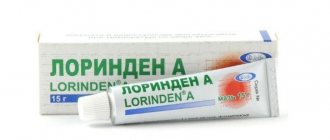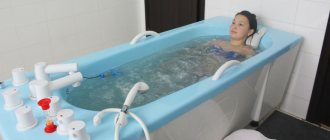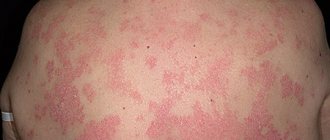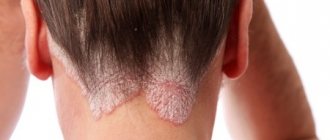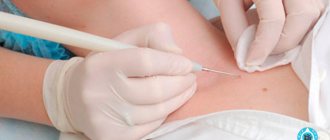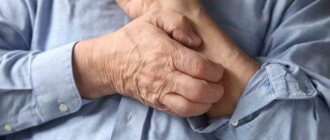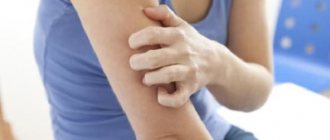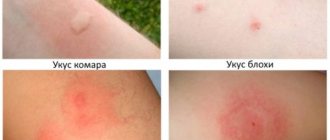Symptoms of itching in psoriasis
Is there itching with psoriasis?
Only in 80 percent of cases. When the pathology worsens, the skin becomes inflamed and convex (dense and rough) plaques form. Initially, areas on the folds of the skin of the elbows, knees, and finger phalanges are affected. If left untreated, further spread is possible. Itching in psoriasis is divided into three stages, depending on the stage of the disease.
| Stages of the disease | Signs |
| Progressive | Small inflammatory lesions on the skin (papules), the appearance of new, very itchy rashes, itch. |
| Stationary | Reduction of itching with a change to a slight tingling sensation. |
| Regressive | Weakening of symptoms, significant reduction in itching. |
https://www.youtube.com/watch?v=UTnArVmp9yA
Other signs of itching:
- small cracks, bleeding of the affected areas;
- separation of the nail plates, change in shape, color (dimples, spots of various shades);
- itching in skin folds (for example, armpits).
Psoriasis (also known as scaly lichen) is currently an incurable chronic disease. Translated from Greek, psoriasis means pruritus, itchy skin. This is a dermatosis accompanied by a rash or red spots with white scales.
The so-called papules merge and form plaques, deteriorating the appearance of the skin. Most often, plaques affect the joints and scalp; psoriasis can occur on the nails and even on internal organs.
In addition, psoriasis affects the joints, causing so-called psoriatic arthritis. It affects 10-15% of patients. Due to such a wide distribution in the human body, the disease is considered psoriatic. According to statistics, 2% of the population suffers from this disease, both men and women equally. It occurs between 15 and 45 years.
The causes of the disease are still unknown, although scientists in all countries of the world are studying this disease. This disease is one of the most studied. Presumably, psoriasis can be provoked by heredity, nerves, infection, excessive cleanliness, bad habits, medications or a malfunction of the immune system, and possibly a complex of these factors.
What are the symptoms of the disease? The most common is itchy skin. However, not every itching is an indicator of psoriasis; only a doctor can diagnose the disease.
More than 80% of patients complain of burning skin, the desire to itch and are looking for any ways to relieve these symptoms. The remaining 20% of patients claim that they do not feel such manifestations. Itching in psoriasis can be a constant concern during the acute period of the disease and subside during remission.
Like any other chronic disease, itchy pain prevents the patient from functioning normally, living a full life, appearing in society, or resting. Many people experience psychological discomfort, unsociability, social phobia, and depression.
Itching in psoriasis can vary in severity and is graded on a 10-point scale (from moderate to severe). With psoriatic erythroderma, patients note a burning sensation, itching of varying degrees of intensity and a strong desire to itch. However, after the relapse stage, the pain may go away, the itching goes away on its own. In recent years, cases of psoriasis accompanied by itching have increased. Efforts were devoted to finding a cure for this disease.
Itching is an irritation of the skin, manifested by tingling and burning, and causing an irresistible desire to scratch the skin. With psoriasis, both existing psoriatic plaques and healthy areas of the body can itch.
Most often, irritation affects joint areas and large folds. Severe itching leads to scratching, causes bleeding in the area of the rash, and can cause skin cracks.
How to get rid of itching with psoriasis should be found out from your doctor at the very beginning of the unpleasant symptom. Scratching the skin increases the likelihood of introducing infectious microorganisms, resulting in a secondary inflammatory process, which requires the use of additional medications.
Does psoriasis itchy or not?
Whether psoriasis itches is an exciting question for patients with this diagnosis. After all, in addition to cosmetic discomfort, they are afraid to suffer from itching. How to relieve itching with psoriasis and how to minimize skin irritation due to pathology, we will consider in this article.
Does psoriasis itchy?
Psoriatic skin lesions are characterized by the appearance of whitish or even grayish plaques on its surface, under which new skin is actively forming. The appearance of such crusts is accompanied not only by a pulling sensation on the skin, but also by itching.
Psoriasis without itching is rarely encountered, and even then only at an early stage. Psoriasis does not always itch if the patient takes antihistamines and is allergic.
Also, itching in psoriasis in some cases is not perceived by the patient with high stress resistance.
According to statistics, every fifth patient with psoriasis calmly tolerates the itching and flaking of the skin due to psoriasis, and can control themselves not to scratch the psoriatic plaques. But psoriasis itches a lot when a stress factor appears.
How to relieve itching with psoriasis
to relieve itching from psoriasis . In the first place is the use of antihistamines, which block the production of histamine and relieve swelling. Helps with itching in psoriasis Suprastin, Eden, Diazolin and others. Since not all drugs have the same effect, you need to select the optimal antihistamine individually.
If psoriasis is constantly itching, the doctor will tell you what to do with such a persistent symptom - he will give prescriptions, refer you to ultraviolet irradiation sessions, and recommend phytotherapeutic preparations. You can get rid of itching due to psoriasis with the help of sanatorium-resort treatment and balneological resorts. If it is not possible to remove the itching of psoriasis the first time, doctors extend the course of treatment.
Psoriasis rash on the body
Skin rashes with psoriasis occur quite often, especially if the patient is allergic. Unpleasant symptoms may appear when the surface of the skin becomes infected as a result of scratching the body. Sometimes with psoriasis, a rash appears after sunbathing - the affected skin reacts very strongly to even the slightest irritant.
The psoriasis rash (Photo 3) may resemble regular hives. If psoriasis rashes fester, the infection can enter the bloodstream and rashes will appear throughout the body. In order to prevent such a situation, a rash on the body due to psoriasis must be immediately treated with antibacterial ointments.
This will make it possible to stop the pathological process. At the same time, for healing, the doctor will prescribe keratolytic agents and reducing drugs.
For rashes on the scalp, special shampoos are recommended, and signs of psoriasis in men localized in the genital area are treated with ointments and creams for psoriasis with a softening effect.
Ointment for itching in psoriasis
All ointments for itching in psoriasis can be divided into hormonal and non-hormonal.
Doctors prefer not to use hormonal agents at the initial stage, but if there is a persistent lack of effect, it is hormonal ointments that provide positive dynamics. Ftorokort, Uniderm, Flucinar, Lorinden ointments have excellent performance.
Triderm ointment gives good results in treatment for psoriasis - according to patient reviews, after using the ointment, itching is significantly reduced. Calcipotriol, salicylic ointment, Kartalin, Cytopsor help with itching in psoriasis.
Zinc ointment dries and relieves irritation, but the best remedy for itching, according to many patients, is Dermovate cream.
It significantly lightens psoriasis spots (see photo), makes the skin smoother, and relieves burning and swelling.
My sources:
Playlist of videos about psoriasis (video selection in the upper right corner)
with friends:
(: 6, average: 4.67 out of 5)
Source: https://www.psoriazo.ru/psoriaz-cheshetsya-ili-net.html
Itching and its causes
The severity of the itch is measured on a scale of 1 to 10 (with 1 being slightly itchy and 10 being itchy until it bleeds). Individual areas and the entire body may itch.
Chocolate is a common trigger for itching
- secondary infections;
- independent use of irritating ointments, creams (especially hormonal ones: topical corticosteroids);
- disturbances in the functioning of the endocrine system;
- psychogenic and neurogenic processes;
- associated allergic reactions;
- food products (coffee, tea, cocoa, chocolate, alcohol, sharp cheeses);
- household chemicals;
- sudden change in climate and air temperature;
- unfavorable production conditions.
The danger for a patient with psoriasis is that you should not scratch these areas. In this case, there is a danger that spots will appear at the scratching sites: the Koebner phenomenon. Therefore, itching must be eliminated.
Itching with psoriasis is evidence of intoxication or other disorders of the body. The main factors contributing to the manifestation of itching:
- endocrine disorders;
- disturbances of material metabolism in the body;
- nervous diseases;
- uncontrolled use of medications.
It also causes the development of an allergic reaction as a result of the use of untested cosmetics, liver diseases, and infection of inflammation sites.
Itching with psoriasis is the most common symptom. According to statistics, it occurs in almost 80% of patients with cutaneous psoriasis. The remaining 20% either do not have it at all, or this symptom does not always appear during an exacerbation of the disease.
The intensity of itching in psoriasis is assessed on a 10-point scale. It can be very minor or so strong that it leads to severe scratching, bleeding of psoriasis plaques and negatively affects the state of the nervous system.
Itching occurs due to irritation of peripheral receptors, signals from which enter the corresponding parts of the brain. In turn, the effect on receptors occurs under the influence of the following changes:
- In the area of psoriasis plaques, a large number of free radicals with irritating properties accumulate;
- The papillary layer of the dermis swells;
- Plaques in psoriasis are covered with keratinized scales, their accumulation leads to skin tightness and increased dryness, that is, to those processes that cause irritation of nerve fibers.
Psoriasis itches more often in people with an easily excitable nervous system, in patients with endocrine diseases and cardiovascular pathologies.
The likelihood of itching and the degree of its severity is also determined by the influence of provoking factors, such as:
- Using incorrectly selected external remedies for psoriasis;
- Allergies to food, household chemicals, cosmetics;
- Non-compliance with the diet - severe itching with psoriasis is possible after drinking alcohol, coffee, or a large amount of sweets;
- Secondary infections - with exacerbation of the disease, the risk of pathogenic microorganisms entering the skin through plaques is increased. Their development and subsequent inflammation can increase itching;
- Sudden changes in weather conditions;
- Stressful situations;
- Exacerbation of chronic pathologies of the gastrointestinal tract.
There are several reasons. The most famous is an allergen that comes with food. Another reason is gastrointestinal disease. Diabetes mellitus, problems with the cardiovascular system, stress, liver disease and others can also be provocateurs of the disease.
It should be immediately recalled that this disease is chronic and cannot be cured. It is only possible to stop the itching and relieve pain. Before starting treatment, the stage of the disease is diagnosed, a blood test is taken, and sensitivity to drugs is checked.
You need to make a full diagnosis of your condition and fight the cause, not the consequences. After these procedures, treatment begins. There are several methods, but all of them are aimed at restoring the skin.
Psoriasis is characterized by the formation of dense plaques, the surface of which can crack and peel. In most cases, the disease occurs without unpleasant symptoms. Itching may be due to:
- improper treatment;
- hypersensitivity reaction;
- damage and infection of the epidermis.
Psoriasis is not a disease of an allergic nature, but in some cases the rash can itch due to the negative effects of various irritants. A common cause of itching is skin contact with household chemicals. This problem occurs if the patient neglects safety rules and does not protect the skin with gloves and other means when cleaning.
Cleaning products can cause itching, so the skin needs to be protected.
For psoriasis, a gentle diet is indicated. The disease affects the entire body as a whole, despite the fact that visible manifestations of the disease appear only on the skin. During an exacerbation of psoriasis, a person’s immune system is weakened, so a large number of food allergens in the diet can lead to itchy skin even in those who are not prone to allergies.
Quite often, itching appears as a result of mechanical damage to the psoriatic plaque. Usually, a new element of the rash appears in this place after some time.
The most common cause of itching in psoriasis is improper treatment of the disease. This happens if the patient neglects the doctor’s recommendations and self-medicates. Often itching appears in response to long-term use of hormonal ointments with glucocorticosteroids. It is important to remember: any medications for psoriasis should be selected only by the attending physician. Self-medication can lead to complications.
When scratching the plaque, a film first appears on its surface, and then pinpoint bleeding. Scratching, scraping, or intentionally damaging the integrity of psoriatic skin lesions can lead to secondary infection. With an exacerbation of psoriasis, a weakened immune system is unable to resist pathogenic agents, so the development of various dermatitis and mycoses is possible.
Itchy skin in most cases indicates lichen or other fungal infection of the epidermis. With psoriasis, this is fraught with aggravation of the symptoms of a chronic disease, since the skin regenerates slowly and any damage to the epidermis can lead to the formation of an area with impaired pigmentation. Characteristic symptoms of skin infection:
- itching and burning;
- suppuration;
- formation of a blistering rash;
- formation of weeping erosions;
- the appearance of plaque, peeling, and irritation on the skin.
Itchy skin with psoriasis may indicate a fungal infection
Treatment depends on the cause of the unpleasant symptoms.
Manifestations of itching
The degree of itching in patients with psoriasis is assessed on a ten-point scale. One point means that the plaques do not itch too much and their scratching is easy to control. Ten points is an unbearable itching sensation that leads to scratching, which leaves bruises on the body, the skin is injured, and the likelihood of a secondary infection increases.
The intensity of irritation increases greatly at the moment the remission stage transitions into an exacerbation of the disease. Sometimes a slight burning and tingling sensation is detected on the body even before the formation of the first psoriatic rash.
After the disease enters the stationary stage, the plaques begin to itch less, and gradually this symptom of the disease goes away.
What to do if itching occurs and how to relieve discomfort should be decided as early as possible. Scratching the skin often causes cracks in the skin; pathogenic microorganisms easily penetrate through them, causing infection and suppuration.
There are two forms of itchy dermatosis in people with psoriasis. Most often, skin irritation is recorded in certain areas of the body, in this case they speak of a limited form of itching. Widespread itching covers the entire body or most of it - this manifestation of psoriasis is more typical for elderly patients.
Itching with psoriasis also negatively affects the nervous system. The constant desire to scratch the skin and the need to control this symptom causes irritability, insomnia, and mood swings.
The term “itching” in medicine refers to skin irritation that causes an irresistible desire to scratch a certain area of the body.
Circumstances of risk
Factors contributing to the manifestation or intensification of itching:
- disease progression;
- improper use of medications;
- general chronic, acute poisoning;
- psychogenic, neurogenic consequences;
- addition of scabies;
- due to HIV-associated development of the disease;
- exposure to chemicals upon contact;
- hazardous production;
- climate change;
- digestive disorders;
- spicy foods, alcohol, coffee, chocolate.
Despite the pronounced signs, it is impossible to independently determine the disease. Special diagnostics are required, which are prescribed by a dermatologist.
Development of pathology
Itching is an invariable sign of psoriasis, regardless of the nature and location of the skin lesion. Its intensity ranges from mild tingling, burning to a strong urge to scratch the inflamed area. Why psoriasis itches can be found out by following the principle of the development of the process:
- the skin of a patient concentrates free radicals more than a healthy one;
- under the increasing influence of negative causes, swelling of the papillary layer occurs;
- Due to skin disorders, chaotic cell division occurs - they quickly peel off and become horny.
Does psoriasis itch at the initial stage? Yes, unpleasant symptoms appear at the first rash, which indicates increased inflammation on the skin. The strength of the desire to scratch depends on the stage of the disease, the area of the affected areas and the location of the development of the pathological process.
Mechanism of development of itching
Itching in a person suffering from psoriasis is a constant sign of the disease. Skin rashes, regardless of their nature and location, will in any case cause discomfort. The intensity of the itching can vary from a slight tingling sensation to an unbearable desire to scratch the skin, even to the appearance of blood. Why can this symptom be different?
The desire to scratch the skin means the following:
- a large number of free radicals are concentrated in the skin than in a healthy person;
- the papillary layer of the dermis begins to swell due to the influence of progressive negative factors;
- metabolic processes in the skin are disrupted, cells begin to divide uncontrollably, which leads to their rapid exfoliation and keratinization.
This mechanism of events is the main one in psoriasis. Against this background, a feeling of burning, tingling and itching appears.
Order pharmaceutical drugs without leaving home
- Akriderm GK cream 30g — 679 rub.
LOOK
Belosalik Lotion solution for external use. approx. 100ml (with spray nozzle) — 640 rub.
LOOK
Diprosalik ointment 30g — 617 rub.
LOOK
Dermovate cream 0.05% 25g - 538 rub.
LOOK
External products are extremely popular. The composition may contain several different components that soften and relieve itching. The most common ones are:
- Capsaicin-based creams (a substance found in cayenne pepper that is used to relieve pain but may cause a burning sensation);
- Intramuscular solutions (Aminazine, Dexamethasone, Prednisolone);
- Antihistamines (Tavegil, Suprastin, Fenkarol, Zyrtec, Erius);
- Creams;
- Lotions;
- Non-hormonal ointments;
- Boltushki (salicylic, zinc, grease);
- Hormonal ointments (Hydrocortisone, Flumethasone, Triamcinolone acetonide, Cloveit ointment (Clobetasol propionate)).
Dexamethasone Suprastin Salicylic ointment Cloveit
Vitamins are prescribed in addition to the main therapy; homeopathic preparations can be used. Pharmaceutical companies produce a huge number of drugs.
Traditional methods of treatment: how to relieve itching with psoriasis at home
Special preparations and procedures with external systemic properties are used. This helps relieve inflammation, discomfort and remission of the disease, when itching practically disappears. Below is an overview of the main treatment methods.
Medication.
External medications are used: ointments, talkers. Relieves severe itching and improves skin.
Quickly help in the first stages of the disease:
- Salicylic ointment. It has a disinfecting effect and restores damaged skin areas.
- Calcipotriol (with vitamin D). Reduces the affected area, prevents keratinization and the development of cracks.
- Alfozil (with birch tar). Improves skin regeneration, restores blood supply to damaged areas. Attention: Use should only begin with small doses!
- Naftalan (with oil). Anesthetizes, cleanses of dead cells. Use strictly according to instructions to avoid complications during relapse.
- Kartalin (with solid oil). Normalizes cell metabolism, removes inflammation.
Hormonal ointments
They are distinguished by the concentration of the main substance. Having a low impact force, usually 0.1 percent, are prescribed to small patients. Can also be used by adults (1 percent) if the disease affects small areas of the skin. Strong compounds are used on extensive damage.
Medicines are produced in the form of tablets and are used as additional means:
- Tavegil. Relieves itching for twelve hours.
- Claritin. Antiallergic. Eliminates itching for up to a day
- Cetrin. A fast-acting remedy that retains its effect for up to three days.
Antihistamines such as Suprastin and others help.
Vitamins
YOU CAN TOO GET RID OF PSORIASIS AND LIVE LIFE TO THE FULLEST
A year ago I managed to get rid of psoriasis. I did it without doctors, who just wanted to rip off money. On my own, at home, in just two weeks I “destroyed” chronic psoriasis, which had tormented me for years, and also significantly improved my health. I cured myself, and I’ll tell you how you too can get rid of this torment. This must be hard to believe? Of course it's difficult. I just have one secret, which I will tell you about next. This will certainly help you too.
Today I want to tell you about a new natural remedy called PSORISIL, which has proven to be incredibly effective. It has passed clinical trials and received quality certificates...
- A – regenerates tissue, participates in keratinization of the skin.
- E – antioxidant, normalizes metabolism, synthesizes DNA.
- D – restores the epidermis, phosphorus-calcium metabolism.
- group B – normalize metabolic processes and the functionality of the nervous system.
Sodium thiosulfate and calcium chloride relieve itching.
Physiotherapy
A course of physiotherapy is prescribed:
- ultraviolet irradiation (UVA, UVB);
- ultrasound;
- rays of Buki;
- magnetotherapy.
- PUVA therapy
Cryotherapy and telex-ray therapy are used. Additionally, they are treated with electrosleep and segmental ultrasound.
Head treatment
In addition to the comprehensive treatment of itching when the scalp is affected, you need to use special shampoos:
- With tar. Softening effect, relieve itching, promote regeneration.
- With zinc pyritine.
Recipes are used to eliminate the symptoms of the disease.
Various plant extracts (almond, olive, etc.) are used to prepare masks. Warm it up before going to bed and tie it on your head after application. In the morning, wash off with the shampoo indicated above. Oils help remove dead cells and relieve itching.
To treat the intimate area, for example, the groin folds, a strong oak decoction is used (bark 1:1 with glycerin).
How to relieve itching with baths? You will need five liters of a mixture of coniferous pine decoction, chamomile, and St. John's wort. Baths with the addition of bran are used to achieve the greatest effect. After the procedures, the affected areas of the skin are moisturized with psoriasis creams. Take such a bath to soothe the skin, relieve inflammation, and activate regeneration.
Herbal treatment
Dill. Two spoons of seeds are poured with boiled water (250 g), allowed to settle, and filtered. Take one hundred grams of infusion three times a day. Another recipe: grind dill seeds and use 1/10 tsp.
Nettle, mint, lemon balm. 8 spoons per liter of boiling water. The decoction can be drunk three times a day.
Burdock. Boil the root for 15 minutes (2 tbsp per 1 liter of water). Take one hundred grams four times a day.
To get rid of itching, it is necessary to identify and eliminate the cause of its occurrence. The basis of treatment is properly selected therapy for psoriasis. Any medications should be prescribed only by a doctor; self-medication may not bring results, but only aggravate the symptom.
If itching is caused by an allergic reaction, you must:
- identify and eliminate the irritant;
- take any antihistamine;
- treat the skin with antihistamine ointment.
In some cases, itching with psoriasis appears due to severe dryness and flaking in the area of the rash. In this case, an ointment with an exfoliating effect helps to get rid of discomfort. Patients are advised to use salicylic, sulfur, zinc ointments. Ichthyol and preparations containing birch tar are often used.
Such medications soften the skin, reduce inflammation and the severity of symptoms, and also have a therapeutic effect, accelerating the regeneration of the epidermis. For non-generalized itching, when only a small area of the skin itches, compresses with ointments are indicated. To do this, you need to apply the ointment to a cotton swab, apply it to the affected area, and secure it with a gauze bandage on top.
If itching bothers you locally, you can use ointment
To get rid of generalized itching, when all the skin on the body is very itchy, baths with birch tar, a decoction of chamomile, calendula or sage help. As practice shows, such baths bring temporary relief, but the itching returns after a while. The only way out is a comprehensive treatment of psoriasis, using medications and physiotherapy.
If itching in psoriasis is caused by a secondary infection, it is necessary to identify the causative agent of the disease. To do this, you should consult a dermatologist. The diagnosis is made after analyzing skin scrapings in the affected area.
For fungal infections, skin treatment with ointments containing an antimycotic (Candide cream, Nystatin ointment) is indicated. Additionally, antifungal drugs are prescribed in tablets. You can also use zinc paste - it has pronounced antimicrobial and antifungal activity and softens the epidermis, alleviating the symptoms of the disease and helping to get rid of itching in psoriasis.
Sedatives help relieve itching in psoriasis. Patients are prescribed validol, corvalol, and valerian tincture. The medications are taken before bedtime. This helps improve the functioning of the nervous system and minimize the risk of developing stress against the background of constantly tormenting itching. It is worth noting that often skin discomfort with psoriasis is caused by psychosomatic disorders and is associated with the patient’s failure to accept his disease.
In this case, patients may feel pain, itching, a feeling of tightness and even a burning sensation in the area of the rash. In this case, it is necessary to treat the psyche, and not the itching of the skin. The patient should consult a psychotherapist for the prescription of sedatives, antidepressants and tranquilizers. Otherwise, there is a high risk of developing neurosis and other disorders of the nervous system.
First of all, focus on treating the disease itself. If the remedies are effective, then the itching goes away quickly. Read about effective treatment methods in the publication: “Treatment of psoriasis at home, in the clinic and in sanatoriums.”
Flaxseed oil helps relieve itching in psoriasis
- General relaxation of the body, elimination of psychological causes. Yoga, psychotherapy, aromatherapy, meditation and relaxation help with this.
- Eliminate irritants. Wear clothes made from soft natural fabrics.
- Take warm (not hot!) baths:
- It is advisable to add herbal decoctions to the bathroom - celandine, chamomile, calendula;
- You can also make the following baths: pour oatmeal into a bag and hang it on the tap;
- baths with salt do not help with itching;
- Some patients are helped by baths with potato starch (500-800 g).
- In case of severe itching, lubricate the rash with oil: linseed, burdock, jojoba, avocado, hazelnut, fir.
- Antihistamines: suprastin, tavegil, zyrtek, fenkarol.
- Ointments for itching in psoriasis are rarely used. Salicylic 5% ointment helps a lot.
- Cold and hot shower.
- Hot air helps some patients. You can blow hot air onto the psoriatic plaques, or heat up a stove and hold your hands over it.
Get step-by-step instructions, diet and treatment plan!
The skin with psoriasis itches to one degree or another throughout the entire period of exacerbation. Symptoms of the disease are reduced under the influence of appropriate drug therapy, which is selected individually for each patient, taking into account his age, the form of psoriasis, and the characteristics of the course of the disease.
Antihistamines, such as:
- Cetrin;
- Zyrtec;
- Claritin;
- Suprastin.
The use of antihistamines is especially necessary if the exacerbation of the disease is caused by the influence of an allergen on the body. Additionally, you can use enterosorbents - Polysorb, activated carbon. Sorbents neutralize toxins and accelerate their removal from the body, which has a positive effect on the condition of the skin.
With increased excitability of the nervous system, taking sedatives - tincture of motherwort, valerian root - helps reduce itching. Their use has a calming effect, prevents the development of depression, improves sleep, and all this has a positive effect on the course of psoriasis.
External remedies also help relieve itching in psoriasis - ointments form the basis of treatment for the skin form of the disease. In uncomplicated cases, patients are initially prescribed non-hormonal drugs, such as:
- Salicylic ointment. One of the most inexpensive drugs for the treatment of psoriasis. It is recommended to start using salicylic ointment when the first symptoms of exacerbation appear. It softens the surface of plaques well, has an antiseptic and distracting effect. For itching, use 2% salicylic ointment, apply it to the plaques 2-3 times a day;
- Ointments based on zinc. They have an anti-inflammatory and astringent effect, preventing the growth of plaques. Ointments with zinc are applied up to 3 times a day, but it is recommended to use them in a short course, since long-term use leads to increased dryness of the skin, which increases itching;
- Calcipotriol. This ointment is based on a synthetic analogue of vitamin D. The use of the ointment normalizes the division of epidermal cells and increases the protective properties of the skin. For itching plaques, treat them with Calcipotriol twice a day, applying the drug in a thin layer. Course of use – up to 2 months;
- Berestin. The ointment is made on the basis of birch tar, its use helps restore the structure of the skin. Apply Berestin to the plaques once a day in a thick layer, after 20 minutes it must be washed off, and after drying, lubricate the treated areas with an emollient cream. Itching after applying Berestin is significantly reduced within 2-3 days.
Elimination methods
The doctor will explain how to get rid of itching for patients with psoriasis. Symptoms of the disease gradually disappear under the influence of complex therapy. If the intensity of itching is assessed at several points, then the treatment regimen includes:
- Antihistamines. Under the influence of antihistamines, the production of inflammatory mediators, which provoke increased skin sensitivity, decreases. Dermatologists prescribe Cetrin, Suprastin, Tavegil.
- Enterosorbents. The use of drugs from this group helps remove harmful substances accumulated in the intestinal lumen from the body, thereby reducing intoxication and allowing the digestive organs to function better.
- Sedatives. Their use improves sleep, eliminates irritability and reduces the sensitivity of nerve endings, which also leads to a reduction in skin irritation.
Medicines that relieve itching of the skin must be taken during the acute phase of the disease. The remaining antipsoriatic drugs are selected individually by the doctor, and the duration of their use often reaches several weeks.
Systemic medications are not the only treatment that helps eliminate skin burning. If itching occurs, it is necessary to use local remedies.
We recommend reading: Antibodies to thyroid peroxidase - what does an elevated level mean in a blood test and treatment methods
Applying ointments and gels to plaques at the initial stage of the disease reduces the likelihood of the formation of severe inflammation, that is, local therapy started on time prevents the appearance of large lesions with psoriatic elements.
The antipruritic effect will be provided by:
- Salicylic ointment. Apply it 2-3 times a day. For psoriasis, 2% ointment is used.
- Zinc paste. Has adsorbent and anti-inflammatory properties. Use zinc paste 2 times a day, but not for long, since prolonged use leads to dry skin. If the skin no longer itches, then discard the zinc paste and use ointments that soften the skin.
- Berestin. It is a liquid emulsion based on tar. Berestin is applied to the plaques once a day, after 20 minutes it is washed off and the skin is treated with a softening cream. With this drug, itching is eliminated in two or three days.
In addition to the use of medications, if a burning sensation occurs, general recommendations must be followed. To reduce skin irritation and prevent scratching, you need to:
- cut your nails short;
- wear clothes made of soft, natural and breathable materials. If the fabrics fit tightly to the body, this leads to chafing of the skin, which increases irritation;
- use soft washcloths and hypoallergenic detergents when carrying out hygiene procedures;
- work with household chemicals only with gloves;
- exclude foods that increase itching from the diet;
- drink more. Clean water helps remove toxins from the subcutaneous layers, which also reduces the inflammatory response.
When psoriasis worsens, the doctor prescribes a course of physiotherapy. The intensity of itching is reduced under the influence of UV rays, cryotherapy, and magnetic therapy.
Hormonal drugs are also good at eliminating discomfort in psoriasis, but they can only be used for a short course and if the doctor decides that their use is advisable for a particular patient.
Effective ways to relieve itching during treatment
Itching with psoriasis appears in 80% of patients. The cause may be provocateurs of psoriasis, infections, or disturbances in the functioning of the body.
Warm baths with various additives are most effective for itching:
- potato starch;
- herbs - celandine, chamomile, calendula;
- oat groats.
Oils that help with severe itching include flaxseed and burdock.
But the main thing is to pay special attention to the treatment of psoriasis and then the itching will go away on its own:
- Exfoliate dry scales and crusts using non-hormonal ointments and creams.
- Treat scalp psoriasis with shampoos.
- After removing the scales, use the device for the treatment of psoriasis with a wavelength of 311 nm.
- Follow a diet and regimen for psoriasis.
- Think positively, think about good things, listen to your favorite music.
Vegetable oils are used among folk remedies. Lotions with any vegetable oil quickly relieve discomfort when skin rashes itch. For this purpose, it is best to use slightly warmed flaxseed, olive or pumpkin oil. Ghee or margarine also helps soften the skin and relieve itching.
Vegetable oils help with many skin problems
Another effective folk remedy is to mix 3 tablespoons of butter with half a spoon of natural birch tar and apply to the skin at night. According to patients, such compresses not only reduce itching, but also help relieve skin inflammation.
Nature itself offers people the opportunity to get rid of itching in psoriasis at the initial stage of the disease - many medicinal plants grow literally under our feet. In addition, such treatment regimens for psoriasis are highly safe.
In cases where there is no doubt whether there is any itching due to psoriasis, it is recommended to resort to the following folk recipes:
- Thoroughly grind 200 g of oak bark and add to 250 ml of water. Boil over moderate heat until boiling and simmer for 20–25 minutes. Filter the broth and add 100 g of glycerin. Apply the mixture to the affected areas of the skin twice a day;
- If psoriasis occurs on the feet and itches, then soda baths will bring relief. To prepare them you will need 4 liters of water, as well as 120 g of soda and 30 g of sea salt. Mix everything. Soak your feet in the prepared solution for 20–30 minutes. Then dry the skin thoroughly with a paper towel;
- An oil compress will eliminate itching when psoriasis affects the scalp. Combine 35 g of peanut butter and as much olive extract in a container. Rub the mixture into the skin using gentle massage movements, then cover your head with a special cap. Wash off the composition with running water after 6.5–8 hours;
- A folk method that helps with itching in large areas of skin inflammation is baths with a decoction of walnut shells. Crumble 500 g of raw materials and pour into 5 liters of boiling water. Leave under a tight lid for 40–60 minutes, then filter and pour into the finished bath. The duration of the procedure is 30–40 minutes. After this, use moisturizing creams.
In addition to external methods of combating itchy skin, it is necessary to take decoctions internally. For example, brew dill seed with boiling water and take 75 ml three times a day. Or prepare soothing teas with lemon balm, chamomile, and celandine.
Below are some recipes:
- You can infuse dill seeds. To do this, you need to brew a few tablespoons of the herb in one glass of boiling water, then let the broth brew for a while, strain and drink a third of a glass several times a day. The duration of treatment is usually two days;
- You can brew burdock root. To do this, take one spoon of the root, add half a liter of water, and boil for 10 minutes. This infusion is taken four times a day;
- Another soothing and antipruritic remedy is tincture of thyme or valerian. To do this, 20 g of herb is poured into one glass of boiling water. You need to drink the infusion three times a day for two to three days;
- Itchy skin can be lubricated with infusion of medicinal lemon balm or almond oil. The scalp is lubricated with an infusion of nettle leaves;
- Some find that rubbing the body with “vinegar water” helps. Baths with starch, bran, pine extract, gelatin and oak bark baths are also done.
Traditional methods are good in their own way. Various ointments, infusions, and herbal baths can help the patient. But the reaction of the body is strictly individual for all people. This must be taken into account when choosing traditional methods of treatment.
But you definitely need to remember to visit a dermatologist. You can skip the early stages of cancer. It is also worth considering that there are procedures that increase itching. These are salt and pine baths, chlorinated water, dry air, heating and freezing of fires.
You need to know that the alkaline background in the body must exceed the acidic one. The level of alkali in a person depends on the food consumed. Every patient must remember that the bulk of food (at least 70%) should be foods that form alkali in the patient’s body.
The proportion of acid-forming products should not be less than 30%. The Pegano method is considered an extremely effective nutritional method.
Medicines effectively and quickly eliminate itching, but have various contraindications, many adverse reactions, and hormonal drugs are addictive. Many ointments cannot be used during pregnancy or breastfeeding; not all medications are suitable for treating children.
If psoriatic plaques appear in the groin area, then it is necessary to wipe the affected areas with a special medicinal solution. Pour 200 g of crushed oak bark into 250 ml of water, cook the mixture over low heat for 20 minutes. Strain the broth, mix with 100 ml of glycerin. Apply the ointment to the spots twice a day.
If your feet itch, you need to regularly take soda baths - dilute 120 g of soda in 4 liters of water, add 30 g of sea salt. Immerse your feet in the solution for 20 minutes. After completing the procedure, gently pat the skin dry with a soft towel. Such baths can also be done for psoriasis on the palms and elbows.
For psoriasis of the scalp, an oil compress will help - mix 35 ml of peanut and olive oil, rub into the skin with massage movements, insulate the head with a plastic cap or towel. The composition should be washed off after 6–8 hours with acidified water.
If large areas of skin are affected in the acute stage, the following folk remedy will help - peel 500 g of walnuts, pour 5 liters of boiling water over the shells, leave in a closed container for 40 minutes. Take a bath daily for 30–40 minutes.
Itching should also be treated from the inside - brew 220 ml of boiling water, 10 g of dill seed, leave for half an hour, strain. Take 75 ml three times a day for two days. In a similar way, you can brew and take infusions of mint, lemon balm, and violet.
Is there itching with psoriasis? This symptom accompanies the initial stage of the disease and practically disappears during remission. You should not scratch the plaques - this can provoke a secondary infection. Various medications and folk remedies will help reduce the occurrence of unpleasant symptoms.
Herbal treatment
Causes of itching
The most common reason is the allergen we eat. Foods such as chocolate, coffee, alcoholic beverages, and spicy foods can cause an “outbreak” of the disease and increase the sensation of scabies.
Another common reason is gastrointestinal diseases, diabetes, cardiovascular diseases, weak liver and nervous system.
In addition, the appearance of itching can be influenced by the general immune picture: stress or depression weakens the body, as a result of which a person’s sensitivity to pain and, accordingly, to any other tactile senses increases.
Doctors also cite excess chemicals and medications as one of the factors: you can overdo it with plaque cream, clogging the surface of the skin. And, thereby, trying to reduce the manifestation of the disease, you only aggravate your condition.
In all these cases, first of all, you need to consult a doctor: after passing the necessary tests and consulting with the relevant specialists, you will be selected the most effective and suitable medications for you. If none of the reasons suits you, try to relieve the itching yourself using the following remedies.
Diagnostics
A dermatologist determines the presence of pathology by typical clinical manifestations and surveys, for example, does psoriasis itch or not? In 20 percent of patients, it does not itch at all - this should be taken into account when diagnosing the disease.
To clarify the diagnosis, he prescribes tests:
- general and blood biochemistry - changes are visible in advanced stages of the disease;
- total urine – changes in water-salt balance may indicate the presence of psoriasis;
- feces - to exclude helminthiasis, which often causes a feeling of itching of the skin.
There are other types of diagnostics.
Instrumental. Includes the following procedures:
- biopsy of the affected area;
- x-ray of joints;
- scraping with culture for microflora.
Differential. It is carried out when it is necessary to identify/exclude the presence of:
- helminths;
- skin (dermatitis) diseases;
- venereal - syphilis;
- parapsoriasis.
Is psoriasis contagious?
This question may be asked by relatives and friends during constant contact with the patient. The answer is definitely no.
People need to understand, have compassion and remember that this disease can affect each of us. So far, the situation with this issue is ambiguous, and others, in most cases, cannot adequately perceive the appearance of patients with psoriasis. This only makes matters worse. It is necessary for each of us to work on ourselves and help those suffering from the disease cope with the disease as easily as possible.
Let's sum it up
Does psoriasis itchy or not? In most cases the answer will be yes. If you experience itching with psoriasis, it should be treated. Without treatment, the disease will progress, the patient will experience severe pain and a desire to itch.
In many cases, consultation with a psychologist is required, since significant damage to an itchy area of skin brings discomfort and exhausts a person mentally.
From the outside it may seem that psoriasis is not such a terrible disease. In fact, this is not so, the disease is serious. There are known cases of death in dermatology.
- Scalp psoriasis symptoms
- Cleansing gel for normal skin
- Cheap ointment for skin allergies
- Subcutaneous mite on the face - photos, symptoms, treatment
Causes
In psoriasis, the following negative factors can cause itching:
- intoxication of the body;
- the presence of concomitant liver problems;
- violation of basic metabolic processes;
- secondary infection of foci of inflammation on the skin;
- diseases affecting the nervous system;
- uncontrolled use of various medications;
- development of allergic reactions (including to the use of inappropriate cosmetics or medicinal products);
- exacerbation of psoriasis in the absence of proper treatment is the main cause of severe itching;
- psychogenic factor;
- sudden change in climatic conditions;
- harmful working conditions;
- drinking alcohol, drinking too much coffee, or eating excessively spicy foods;
- the presence of diseases affecting the digestive system;
- negative effects on the body of various chemicals.
Folk remedies
To treat itching in psoriasis, you can use traditional medicine. The most popular of them:
- Vegetable oils. To reduce itching, it is recommended to treat inflamed areas with herbal extracts. You can use olive, coconut, almond oil. Before use, the product is heated to body temperature and kept on the skin for several hours, after which it is washed off.
- Application of oak bark. An infusion is prepared using plant materials in the amount of 2 tablespoons per 210 ml of boiling water. After 25 minutes, it is filtered and 100 ml of glycerin is added. The resulting mixture is used to treat all problem areas several times a day.
- Melissa infusion. It has a mild sedative effect, which will help soothe itching. To prepare the infusion, add 245 ml of boiling water to 2 tablespoons of plant material and leave for 15 minutes. The resulting volume of liquid is drunk throughout the day in three doses.
